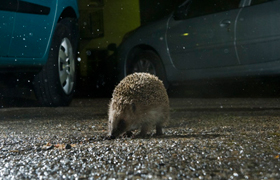Volunteers with gardens needed for hedgehog research
Release Date 08 August 2012

Dr Phil Baker from the University's School of Biological Sciences is launching a study to examine hedgehog populations in gardens throughout Reading and the surrounding areas, and needs help from local volunteers.
Hedgehog numbers are widely thought to have declined in the UK within the last 20 years, and changes in agriculture are believed to be part of the problem. However, one habitat where they may be doing well is the suburbs of our towns and cities.
Relatively little is known about factors affecting the distribution of hedgehogs in gardens in urban areas, so this study aims to determine whereabouts they are living, and gain an understanding of why this might be - for example, does the presence of dogs have an impact?
Dr Baker explains: "Many people are not aware that their garden is a home for hedgehogs, as earlier work suggests that they do most of their activities after the majority of people have gone to bed. This means that direct observation, for example asking people outright whether they are aware of any hedgehogs in their garden, might produce biased results.
"Volunteers will simply be asked to have a small plastic tunnel in their garden for a week or two, to record the footprints of any hedgehogs that walk through it. This technique will give us the first real indication of where hedgehogs actually are in urban areas, rather than relying on peoples' perceptions since we know that these can be wrong.
"Consequently, it is important to say that we would like people to get involved even if they think they do not have any hedgehogs. We need as many volunteers as possible so please do get in touch if you would like to help."
If you are interested in taking part, and you live in Reading or the surrounding areas, email Dr Phil Baker - p.j.baker@reading.ac.uk.
ENDS
(Photo courtesy of Laurent Geslin)
Follow us on Twitter | Like us on Facebook | Read our research blog 'The Forum'